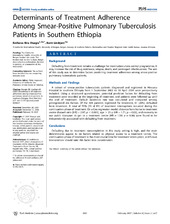Determinants of Treatment Adherence Among Smear-Positive Pulmonary Tuberculosis Patients in Southern Ethiopia
Peer reviewed, Journal article
Permanent lenke
https://hdl.handle.net/1956/2102Utgivelsesdato
2007-02-13Metadata
Vis full innførselSamlinger
Originalversjon
https://doi.org/10.1371/journal.pmed.0040037Sammendrag
Background: Defaulting from treatment remains a challenge for most tuberculosis control programmes. It may increase the risk of drug resistance, relapse, death, and prolonged infectiousness. The aim of this study was to determine factors predicting treatment adherence among smear-positive pulmonary tuberculosis patients. Methods and Findings: A cohort of smear-positive tuberculosis patients diagnosed and registered in Hossana Hospital in southern Ethiopia from 1 September 2002 to 30 April 2004 were prospectively included. Using a structured questionnaire, potential predictor factors for defaulting from treatment were recorded at the beginning of treatment, and patients were followed up until the end of treatment. Default incidence rate was calculated and compared among preregistered risk factors. Of the 404 patients registered for treatment, 81 (20%) defaulted from treatment. A total of 91% (74 of 81) of treatment interruptions occurred during the continuation phase of treatment. On a Cox regression model, distance from home to treatment centre (hazard ratio [HR] = 2.97; p < 0.001), age > 25 y (HR = 1.71; p = 0.02), and necessity to use public transport to get to a treatment centre (HR = 1.59; p = 0.06) were found to be independently associated with defaulting from treatment. Conclusions: Defaulting due to treatment noncompletion in this study setting is high, and the main determinants appear to be factors related to physical access to a treatment centre. The continuation phase of treatment is the most crucial time for treatment interruption, and future interventions should take this factor into consideration.
